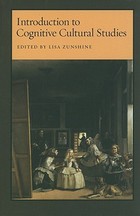 |
| Trade paperback, 386 pages Published 2010 Borrowed from the library Read March 2013 |
edited by Lisa Zunshine
The idea of cognitive literary theory either seems seductive or appalling to critics-- most seeming coming down on the side of appalling because of a tendency to reductionism, or maybe just because it'd put most of them out of a job. I didn't have any strong opinions on the topic myself, beyond the fact that the two cognitive science-based talks I'd been to were terrible... but if we judged literary theories by bad talks, we wouldn't have much of a field. So I asked a devotee to recommend a book that would (if any book could) sell me on the field, and he recommended this, an anthology of various essays edited by Lisa Zunshine. Actually, by the time I got around to reading it, I'd already read Zunshine's Strange Concepts and the Stories They Make Possible, but that's another review.
Maybe I was just in a bad mood when I read it (I did read it coming off nine months of exam reading), but I find myself unconvinced. Even by Zunshine's own essays, and I actually found the work she presented in Strange Concepts fairly convincing. It may be an artifact of the book's size: though in theory it's 386 pages long, the last 76 are notes, bibliography, and index, meaning you have 310 pages for 15 essays. That's 20 pages per essay, which might seem like enough, but these essays have a lot of lifting to do, in that they have to establish their cog-sci concepts for an audience of literary scholars and use them to do a compelling reading of a text. In Strange Concepts, Zunshine uses a full third of the book on the cog-sci setup! So you're left with a lot of hastily conveyed details of cognitive science and then an even more hastily conveyed literary reading.
The true proof of any literary theory is of course in the results it spits out, and I rarely felt convinced by the cog-sci reading of the texts in question. Or rather, at best, I felt no more convinced than I would be by any other literary theory, but cog-sci tries to make a special claim on truth beyond that of most literary theory: Zunshine says in the introduction, "cognitive cultural studies is cultural studies as originally conceptualized" (8). And later: "the grounding assumptions of cognitive evolutionary science... make this science indispensable to nonreductive cultural analysis" (13). But I never felt like I was reading analyses where the the theory was indispensable; the essays struck me as being like much literary criticism that attempts to bring in theories from other disciplines. Yes, that's neat... but so what? Why should I buy that more than any other reading? Because you read an article in Science? (I don't have a firm grasp of what actual cognitive scientists think of cognitive criticism, and I am curious.) Okay, I am being glib, but hopefully my glibness reveals an underlying point: as presented in this book, at least, cognitive literary theory does not offer any textual readings that make me more interested in it than in any other literary theory. Most are fine, some are awful.
I did quite like Patrick Colm Hogan's essay "Literary Universals," which made a cogent argument for both why we ought to look at literary universals and how examining such might be useful. I found myself agreeing, though not tempted to do such work myself (much as I agree we ought to study black holes, but have no desire to become an astrophysicist). Unfortunately, it's the second essay, so it's all downhill from there.
I found myself, on the other hand, a little baffled by the idea of cognitive historicism, which seems no different from any other literature and science criticism. It looks at how authors rendered the cognitive theory of their day in literary texts, just as (for example) Gillian Beer looks at how George Eliot rendered the evolutionary theory of her day in her novels. Those old cognitive theories don't have any compelling purchase on truth, as it is not based on those "grounding assumptions of cognitive evolutionary science," so why should I be into that kind of reading any more than Shuttleworth's? Not that I'm besmirching this kind of work-- I do a very similar work myself-- I'm just not convinced it belongs in this book.
No comments:
Post a Comment